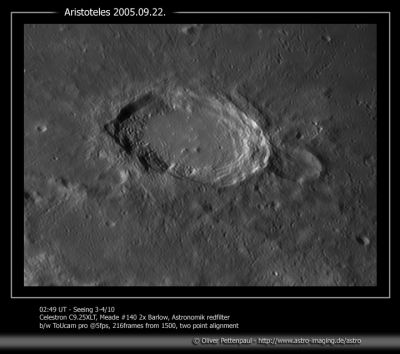Aristoteles
Contents
Aristoteles
|
Lat: 50.2°N, Long: 17.4°E, Diam: 87 km, Depth: 3.5 km, Rükl: 5, Eratosthenian |

Oliver Pettenpaul Aristoteles is the large crater. The small one it overlays on the right is Mitchell.
Images
LPOD Photo Gallery Lunar Orbiter Images LO Stereo Wes Higgins
http://bit.ly/2y8WrRl (LRO's orbital close-up of the chain of craterlets north-northwest of Aristoteles, once known as Rima Aristoteles).
Maps
(LAC zone 13D4) LAC map Geologic map
Description
Description: Elger
(IAU Directions) ARISTOTELES.--A magnificent ring-plain, 60 miles in diameter, with a complex border, surmounted by peaks, rising to nearly 11,000 feet above the floor, one of which on the E., pertaining to a terrace, stands out as a brilliant spot in the midst of shadow when the interior is filled with shadow. The formation presents its most striking aspect at sunrise, when the shadow of the E. wall just covers the floor, and the brilliant inner slope of the W. wall with the little crater on its crest is fully illuminated. At this phase the details of the terraces are seen to the best advantage. The arrangement of the parallel ridges and rows of hills on the N.W. and S.E. is likewise better seen at this time than under an evening sun. A bright and deep ring-plain, about 10 miles in diameter, with a distinct central mountain, is connected with the E. wall.
Description: Wikipedia
Additional Information
- Depth data from Kurt Fisher database
- Pike, 1976: 3.5 km
- Westfall, 2000: 3.5 km
- Viscardy, 1985: 3.7 km
- Cherrington, 1969: 3.65 km
- Interior peak heights
- Sekiguchi, 1972:
- 0.5 km - Theta: "The most distinct peak, standing on the southerly eccentric position of the floor."
- 0.3 km - "A distinct ridge standing to the west of [Theta]."
- 0.6 km shadow falling to the west - "A distinct uncinate dyke on the south wall." - - fatastronomer
- Sekiguchi, 1972:
- Central peak composition: Anorthosite + GNTA2 + AN (Tompkins & Pieters, 1999)
- Included in ALPO list of bright ray craters.
- East rim slope 32° (Pohn, 1963)
- Exterior impact melt deposits most extensive to S, max of ~20 km beyond rim. Most extensive ejecta, rays and secondary craters to the N, with max wall slumping on E side of crater (Hawke and Head, 1977).
- TSI = 35, CPI = 25, FI = 20; MI =80 Smith and Sanchez, 1973
Nomenclature
- Aristotle (384 BC – 322 BC) was a Greek philosopher, a student of Plato and teacher of Alexander the Great. He wrote on diverse subjects, including physics, metaphysics, poetry (including theater), biology and zoology, logic, rhetoric, politics, government, and ethics. Along with Socrates and Plato, Aristotle was one of the most influential of the ancient Greek philosophers.
- A conspicuous crater somewhere northeast of Aristoteles was called Mrs. Somerville by John Lee. - DannyCaes Oct 11, 2015
- One of the radial craterlet-chains near Aristoteles once received the name Rima Aristoteles (see Chart 4 in the Times Atlas of the Moon, north-northwest of Aristoteles).
- Aristoteles Gamma (hillock north of Aristoteles, see Chart 4 in the Times Atlas of the Moon).
- Aristoteles Zeta and Theta (the two peaks slightly southward of the centre of Aristoteles, see Chart 11 in the Times Atlas of the Moon). SLC map C1 shows Aristoteles Zeta and Aristoteles Phi (an error?).
LPOD Articles
A Table of Contents Alexander's Teacher Frigid Buddies: Aristoteles and Eudoxus Twins Not Younger or Older Eating a Smaller Fry
Bibliography